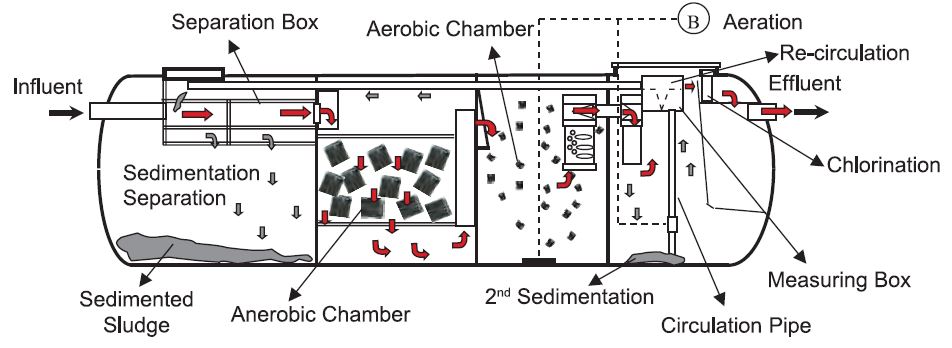Best Sewage Treatment Solution for Housing Societies!

When considering sewage treatment solutions for housing societies, several options are available, depending on factors such as the size of the society, local regulations, budget, and environmental considerations. Here are a few commonly used solutions:
Centralized Sewage Treatment Plant (STP): A centralized STP is a large-scale treatment facility that serves multiple housing societies or buildings. It involves collecting sewage from all the individual units within the society and transporting it to the central plant for treatment. Centralized STPs often employ advanced treatment processes like activated sludge, extended aeration, or membrane bioreactors to achieve high-quality effluent. This option requires extensive infrastructure and maintenance but can provide effective treatment for large housing societies.
Decentralized Sewage Treatment Systems: Decentralized systems offer on-site or small-scale treatment within the housing society. They can be more cost-effective and flexible, particularly for smaller societies. Some decentralized options include:
- Sequencing Batch Reactor (SBR): SBR systems treat sewage in batches, utilizing biological treatment processes. They are compact and can be customized to match the sewage load of the society. SBRs can achieve high treatment efficiency and produce quality effluent.
- Membrane Bioreactor (MBR): MBR systems combine biological treatment with membrane filtration. They provide excellent treatment and produce high-quality effluent. MBRs are compact and suitable for societies with limited space availability.
- Moving Bed Biofilm Reactor (MBBR): MBBR systems utilize a biofilm process in which fixed-film carriers provide surface area for microbial growth. They are effective in treating organic matter and can be implemented in small to medium-sized societies.
- Constructed Wetlands: Constructed wetlands mimic natural wetland ecosystems to treat sewage. They use a combination of physical, biological, and chemical processes to remove contaminants. Constructed wetlands can be aesthetically pleasing, support biodiversity, and provide an environmentally friendly treatment solution.
- Packaged Sewage Treatment Plants: Packaged plants like Johkasou STP (mentioned earlier) are pre-fabricated, modular systems that offer compact and efficient sewage treatment. These plants incorporate various treatment processes and are suitable for small to medium-sized housing societies.
- Septic Tanks: Septic tanks are a traditional, individual on-site sewage treatment option. They provide basic treatment by separating solids from liquid effluent, which then leaches into the surrounding soil. While septic tanks are relatively low-cost and simple to install, they typically offer limited treatment and may require regular maintenance and periodic desludging.
Out of the above-stated solutions, the one solution which is gaining the most popularity and acceptance is the Japanese Johkasou System. Johkasou STP can be considered a suitable sewage treatment solution for housing societies in India for several reasons:

- Efficient and Reliable Performance: Johkasou STP is known for its efficient and reliable performance in treating sewage. It incorporates advanced treatment processes such as anaerobic and aerobic digestion, filtration, and disinfection. These processes effectively remove contaminants, organic matter, and pathogens from the sewage, ensuring a high level of treatment efficiency.
- Compact Design and Easy Installation: Johkasou STP is designed to be compact and modular, making it suitable for housing societies with limited space availability. The pre-fabricated units can be easily transported and installed, minimizing the construction time and disruption to the surroundings. The flexibility in sizing allows customization based on the sewage generation and site requirements.
- Compliance with Regulatory Standards: In India, housing societies are required to comply with environmental regulations and obtain necessary permits for sewage treatment. Johkasou STP is designed to meet the regulatory standards set by pollution control boards and local authorities. By utilizing Johkasou STP, housing societies can ensure that their sewage treatment system meets the necessary compliance criteria.
- Odor Control: Johkasou STP incorporates odor control mechanisms to minimize unpleasant smells associated with sewage treatment. The system includes ventilation systems and odor control units that prevent the release of foul odors, creating a more pleasant living environment for residents.
- Water Reuse Potential: Water scarcity is a significant concern in many parts of India. Johkasou STP offers the potential for treated wastewater reuse within the housing society for purposes such as gardening, toilet flushing, or non-potable applications. By implementing water reuse systems, housing societies can contribute to water conservation efforts and reduce their dependence on freshwater sources.
- Long-Term Cost Efficiency: While the initial investment for Johkasou STP may be higher compared to traditional septic tanks, it offers long-term cost efficiency. The system requires less frequent maintenance and has a longer operational lifespan. Additionally, the high-quality treated effluent reduces the need for additional tertiary treatment or costly repairs, resulting in overall cost savings.
- Scalability and Flexibility: Housing societies in India may have varying sewage generation rates, ranging from small-scale residential complexes to large integrated townships. Johkasou STP offers scalability, allowing housing societies to choose the appropriate system size based on their specific requirements. The modular design also allows for future expansions or modifications if needed.
- Environmental Sustainability: By implementing Johkasou STP, housing societies contribute to environmental sustainability. The system effectively treats sewage, removing pollutants and reducing the risk of contamination of water bodies and groundwater. This helps in maintaining ecological balance and protecting the environment.
It is essential to consider local regulations, environmental impact, treatment efficiency, maintenance requirements, and the specific needs of the housing society when selecting a sewage treatment solution. Consulting with wastewater treatment experts and local authorities can help determine the most suitable option for a given housing society.

Overall, Johkasou STP provides efficient and reliable sewage treatment for housing societies in India. Its compact design, compliance with regulatory standards, odor control features, potential for water reuse, long-term cost efficiency, scalability, and environmental sustainability make it a preferred choice for housing societies aiming to implement effective and sustainable sewage treatment systems.

